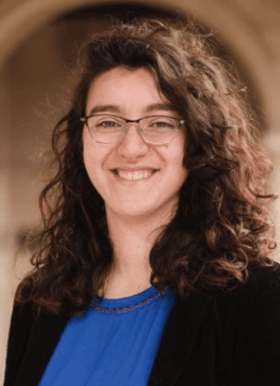
Charlotte Fressilli
Senior Tutor
- BA in English and Italian Studies, Wheaton College
- MA in English and American Literature, Washington University in St. Louis
- PhD in English and American Literature, Washington University in St. Louis
Dr. Fressilli has held teaching positions in a wide range of settings, including in public and private high schools, middle school programs in the US and abroad, and at Washington University in St. Louis. During her time as a PhD student at WashU, she taught several courses, including College Writing: Writing Identity, “If I Remember Correctly”: Literature, Trauma, and the Violence of Contested Histories, and Literature in English: Modern Texts and Contexts. She has also co-taught Guided Research in Composition, the training course for peer tutors at The Writing Center, alongside Dr. Rob Patterson.
During her time as a graduate student, Dr. Fressilli also served as a Lynne Cooper Harvey Fellow in American Cultural Studies (2017-2024), a Graduate Fellow at the Center for the Humanities (2022), and the inaugural Dr. Burton Pu Distinguished Fellow at the Writing Center (2023-2024). Read more about the Dr. Burton Pu Distinguished Fellowship here.
Her dissertation, Forgetting About It: Italian American Narratives, Whiteness, and the Violence of Contested Histories, builds on research interests in 20th/21st-century American literature, race and ethnicity studies, trauma studies, and ignorance studies, as well as American literary engagement with fascism during the interwar period. Her hobbies include knitting, crocheting, paper collage, growing tomatoes on her patio, playing volleyball poorly, and inventing new nicknames for her dog.
What brought you to The Writing Center?
I came to The Writing Center in 2021 as a graduate fellow. I was eager to support other writers on campus and was in search of support with writing my own dissertation, too. I quickly discovered that I am passionate about writing center work and have worked at The Writing Center ever since, as a graduate fellow for three years and now as a senior tutor.
What do you like most about working with writers at The Writing Center?
I find working at The Writing Center to be immensely fulfilling! I am a naturally enthusiastic person, so supporting writers across the university gives me the chance to show genuine interest and investment in the amazing writing that happens on this campus every day. I love to learn about what others care about, especially when they are working with materials and from within fields that are very different from my own. Whether I’m supporting a writer with the draft of an economics article or an artist statement—a dissertation in anthropology or a legal memo—I learn a great deal through my work, and I feel lucky in that.
I have also always been drawn to the non-hierarchical principles at the heart of the Writing Center. As tutors, we represent a third space outside of the relationship between instructor and student, where writers can come to experiment with their ideas differently than is sometimes possible in the classroom. I aspire to center student agency in my teaching as well, but am grateful that this goal is baked into writing center work in such a way that allows me to really lean into, encourage, and celebrate the agency of the writers with whom I work.
What do you find most challenging about writing?
For me, the hardest part of the writing process has always been organizing early drafts. It is sometimes difficult for me to detach from the original shape of my thinking—how I came to my central idea step by step—and move toward a new structure that will serve my audience best. Several techniques that I have learned at the Writing Center have helped me greatly in tackling this challenge! I create a “reverse outline” of nearly everything I write when I reach that early draft stage now, for example. I have also learned that, once I reach this part of the process, it is important for me to share my drafts and talk through my ideas with others.
What advice do you have for writers?
My best advice for writers is to become comfortable sharing early ideas and rough drafts with safe audiences! Offering up our work for others to engage with can be stressful, but it is also a crucial part of allowing our writing and thinking to grow. So often, I meet with writers who believe they need to polish and perfect their writing before they share it with me. On the contrary, I love to work with ideas right at the beginning, when they are just starting to form, or in the middle of the process, when everything is most messy. Not all audiences are built to engage with writing at these earlier stages. Finding safe audiences who welcome writing in all of its “un-doneness” is crucial, however, both for developing individual projects and for growing as a writer overall! It is scary to share writing, but it is worth it.